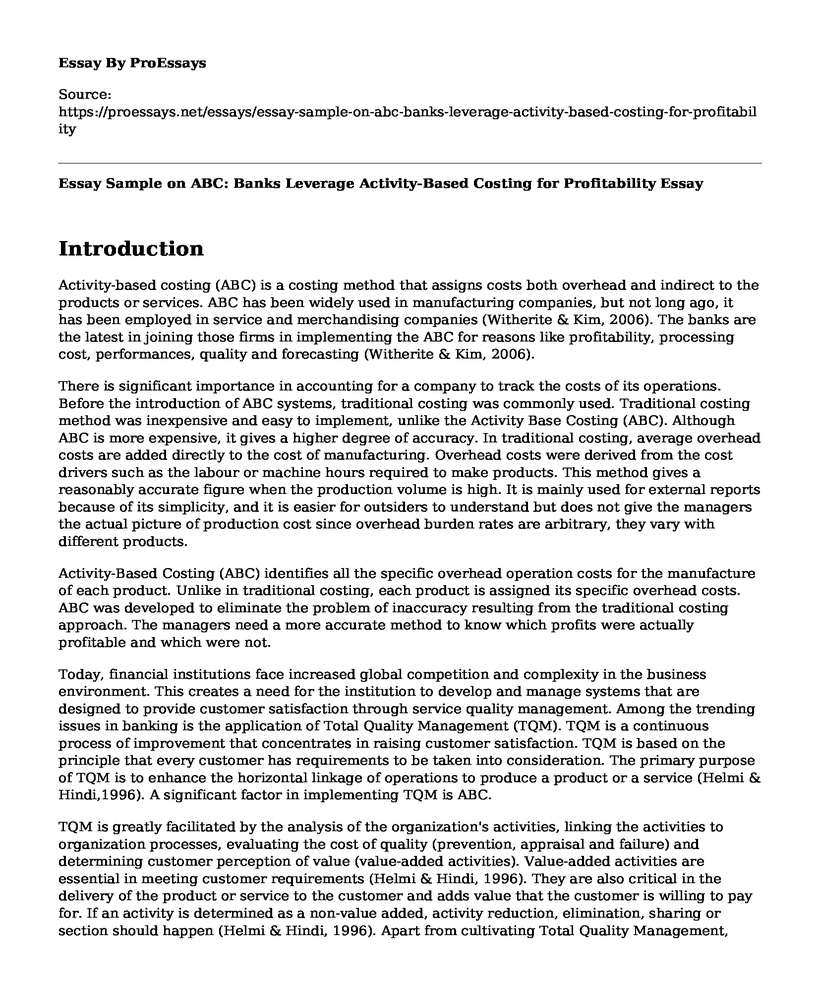Introduction
Activity-based costing (ABC) is a costing method that assigns costs both overhead and indirect to the products or services. ABC has been widely used in manufacturing companies, but not long ago, it has been employed in service and merchandising companies (Witherite & Kim, 2006). The banks are the latest in joining those firms in implementing the ABC for reasons like profitability, processing cost, performances, quality and forecasting (Witherite & Kim, 2006).
There is significant importance in accounting for a company to track the costs of its operations. Before the introduction of ABC systems, traditional costing was commonly used. Traditional costing method was inexpensive and easy to implement, unlike the Activity Base Costing (ABC). Although ABC is more expensive, it gives a higher degree of accuracy. In traditional costing, average overhead costs are added directly to the cost of manufacturing. Overhead costs were derived from the cost drivers such as the labour or machine hours required to make products. This method gives a reasonably accurate figure when the production volume is high. It is mainly used for external reports because of its simplicity, and it is easier for outsiders to understand but does not give the managers the actual picture of production cost since overhead burden rates are arbitrary, they vary with different products.
Activity-Based Costing (ABC) identifies all the specific overhead operation costs for the manufacture of each product. Unlike in traditional costing, each product is assigned its specific overhead costs. ABC was developed to eliminate the problem of inaccuracy resulting from the traditional costing approach. The managers need a more accurate method to know which profits were actually profitable and which were not.
Today, financial institutions face increased global competition and complexity in the business environment. This creates a need for the institution to develop and manage systems that are designed to provide customer satisfaction through service quality management. Among the trending issues in banking is the application of Total Quality Management (TQM). TQM is a continuous process of improvement that concentrates in raising customer satisfaction. TQM is based on the principle that every customer has requirements to be taken into consideration. The primary purpose of TQM is to enhance the horizontal linkage of operations to produce a product or a service (Helmi & Hindi,1996). A significant factor in implementing TQM is ABC.
TQM is greatly facilitated by the analysis of the organization's activities, linking the activities to organization processes, evaluating the cost of quality (prevention, appraisal and failure) and determining customer perception of value (value-added activities). Value-added activities are essential in meeting customer requirements (Helmi & Hindi, 1996). They are also critical in the delivery of the product or service to the customer and adds value that the customer is willing to pay for. If an activity is determined as a non-value added, activity reduction, elimination, sharing or section should happen (Helmi & Hindi, 1996). Apart from cultivating Total Quality Management, ABC also promotes value analysis and benchmarking (Helmi & Hindi, 1996).
ABC can be used in predicting future fluctuations of incomes and aid in proper planning to avoid risks. Any bank must offer low cost services with higher quality to survive the stiff competition in banking in future (Helmi & Hindi, 1996). Therefore Activity Based Costing should be implemented to oversee the issue.
References
Helmi, M. A., & Hindi, N. (1996). Activity-based costing (ABC) in banking: A big challenge. Journal of Performance Management, 9(2), 5.
Witherite, J., & Kim, I. W. (2006). Implementing activity-based costing in the banking industry: benefits include the proper costing of transactions, the ability to trace specific costs to bank customers and the ability to measure customer and product profitability. Bank Accounting & Finance, 19(3), 29-35.
Cite this page
Essay Sample on ABC: Banks Leverage Activity-Based Costing for Profitability. (2023, Feb 27). Retrieved from https://proessays.net/essays/essay-sample-on-abc-banks-leverage-activity-based-costing-for-profitability
If you are the original author of this essay and no longer wish to have it published on the ProEssays website, please click below to request its removal:
- The Role of Account Subjectivity and Risk of Material Misstatement Paper Example
- Essay on Money Laundering: Destructive Risk to State, Banks and Community
- Tariffs: Taxes, Protectionism, and Globalization - Essay Sample
- Mutual Funds: Investment Strategy & Professional Money Managers - Essay Sample
- Exploring Long-Term Care Insurance in Canada: Essay Sample
- Essay Example on BlackRock: Analyzing Path to Financial Success
- Cloud Bank and Investment Group - Research Paper Sample







